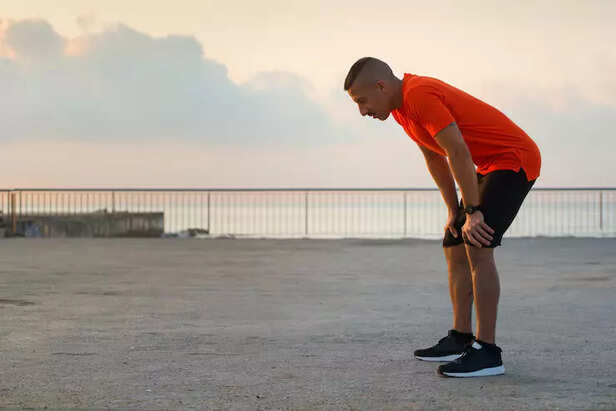Think Hustling Is the Key to Success? Here’s the Brutal Truth No One Tells You!
Amritansh Nayak | Apr 26, 2025, 17:15 IST
The negative consequences of the "no pain, no gain" mentality are examined in this article. It emphasizes how attentive progress, rest, and recuperation are necessary for long-term improvement. Additionally, it cautions against false information propagated by fitness celebrities and exhorts youth to place a higher value on education, sound advice, and long-term health than on irrational internet ideals.
Many people have come to believe that true success must come through difficulty because of a culture that exalts hustling, pain, and perpetual productivity. The idea of pushing boundaries is frequently praised, even at the expense of wellbeing, whether in the workplace, the gym, or personal development. However, behind the surface is a distinct reality: balance, not exhaustion, is where growth thrives. This essay discusses healthier, more sustainable strategies to advance while challenging the detrimental notions of toxic production.

Rest is sometimes viewed as a luxury or, worse, a sign of weakness in a society that is fixated on hustle and continual productivity. In actuality, however, rest and recuperation serve as the cornerstone of advancement rather than its hindrance. Growth occurs in the area that follows the grind, not during it, whether you're working towards a personal goal, developing a job, or training your body. Athletes are well aware that muscular growth and strength occur during recovery rather than while weightlifting. The brain operates on the same principle. Our ability to concentrate, be creative, and make decisions suffers when we don't take breaks.
Not only can chronic stress, sleep deprivation, and hectic schedules impede improvement, they can actually reverse it. Neglecting sleep frequently leads to burnout, exhaustion, and even mental health issues. Paying attention to your body and mind is clever, not lazy. It is essential for longevity. Rest is more than just getting extra sleep. It's allowing oneself to slow down, saying no, establishing boundaries, and taking mental breaks. Doing what your body and mind require to recover and flourish is more important than doing nothing at all.

Your wellbeing doesn't have to suffer in order to make progress. In actuality, a balanced strategy that strikes a balance between ambition and care, work and intention, leads to real, long-lasting growth. First, reinterpret what "hard work" actually means. Presenting yourself regularly, even in tiny ways, with clarity and purpose is more important than pushing yourself until you break. Establishing quantifiable, attainable goals rather than ambiguous or radical ones keeps you inspired without exhausting you. You may remain conscious of your boundaries and pay attention to what you truly need by incorporating mindfulness into your daily routine.
It could be as easy as checking in with oneself during stressful situations or pause before responding "yes." Rest is a necessary element of the process, not a reward. Plan it out just like you would at work. Above everything else, cultivate self-compassion. You won't be flawless all the time. You will have days off. Sustainable progress is adaptable, human, and forgiving; it is not linear. By changing the emphasis from working tirelessly to developing carefully, you forge a route to achievement that empowers you rather than wears you out.

The expression "push through the pain" is frequently exalted in contexts related to self-improvement, employment, and fitness. The actual, hidden costs of continuously dismissing suffering in the name of progress, however, are rarely brought up. Pushing through discomfort might result in long-term harm to the body. What begins as mild discomfort can develop into long-term illnesses that keep you out of commission for months or even years. Constantly working too much at work might lead to sleep difficulties, exhaustion, and reduced immunity. The impacts might be equally detrimental to the mind. Burnout, a condition of total mental and emotional tiredness, can result from ignoring stress, anxiety, or emotional exhaustion.
Even when you're working harder than ever, you might find yourself feeling unmotivated, unable to concentrate, or disconnected from your objectives. This grind mentality frequently produces emotional pressure to constantly "do more" and guilt over taking breaks. Your connection with oneself may suffer as a result, transforming self-control into self-punishment. Pain is not necessary for true advancement; awareness is. It's not weakness to know when to stop, take a break, or seek assistance; it's wisdom. While there may be short-term benefits to ignoring discomfort, long-term setbacks are nearly always the result.

Fitness influencers have a huge impact on young people's perceptions of exercise, health, and body image in the social media age. Though many encourage inspiration and change, not all guidance is reliable or secure. The fact that influencers frequently put appearance before fitness is a developing worry. There is minimal discussion of shape, utility, or long-term health, with shredded abs and bulked-up arms being displayed as the norm. Motivated by these idealized bodies, young gym-goers frequently skip the fundamentals—proper warm-ups, technique, progressive overload—and dive right into more difficult exercises or heavy lifting without supervision. Even worse, a lot of influencers advocate unsustainable "quick fixes" like drastic diets, excessive supplementation, or strenuous exercise regimens that are inappropriate for novices.
Some even promote negative body image norms, which can result in problems like anxiety at the gym, overtraining, or low self-esteem. Misinformation, not ambition, is the issue. Without expert guidance, children run the risk of getting hurt, burning out, and not understanding what fitness really is. Viral trends are not the foundation of true gym growth; patience, education, and persistence are. It's important to confirm credentials, get advice from experts, and keep in mind that fitness is a journey rather than a quick fix before beginning any practice.
Suffering is not necessary for progress; self-awareness is. We can overcome damaging fitness misconceptions and burnout culture by appreciating downtime, getting reliable advice, and rethinking what hard work actually means. Intention, not intensity, is the foundation of sustainable success. It's time to work with wellbeing in mind and swap out the hustle for knowledge.
Explore the latest trends and tips in Health & Fitness, Travel, Life Hacks, Fashion & Beauty, and Relationships at Times Life!

importance of sleep
The Strength of Sleep and Recuperation
Not only can chronic stress, sleep deprivation, and hectic schedules impede improvement, they can actually reverse it. Neglecting sleep frequently leads to burnout, exhaustion, and even mental health issues. Paying attention to your body and mind is clever, not lazy. It is essential for longevity. Rest is more than just getting extra sleep. It's allowing oneself to slow down, saying no, establishing boundaries, and taking mental breaks. Doing what your body and mind require to recover and flourish is more important than doing nothing at all.

healthy lifestyle
Developing a Healthy, Sustainable Method for Progress
It could be as easy as checking in with oneself during stressful situations or pause before responding "yes." Rest is a necessary element of the process, not a reward. Plan it out just like you would at work. Above everything else, cultivate self-compassion. You won't be flawless all the time. You will have days off. Sustainable progress is adaptable, human, and forgiving; it is not linear. By changing the emphasis from working tirelessly to developing carefully, you forge a route to achievement that empowers you rather than wears you out.

ignoring pain?
The Unspoken Price of Ignoring Pain
Even when you're working harder than ever, you might find yourself feeling unmotivated, unable to concentrate, or disconnected from your objectives. This grind mentality frequently produces emotional pressure to constantly "do more" and guilt over taking breaks. Your connection with oneself may suffer as a result, transforming self-control into self-punishment. Pain is not necessary for true advancement; awareness is. It's not weakness to know when to stop, take a break, or seek assistance; it's wisdom. While there may be short-term benefits to ignoring discomfort, long-term setbacks are nearly always the result.

influencers misguiding youngsters
How Influencers Are Misguiding Youngsters?
Some even promote negative body image norms, which can result in problems like anxiety at the gym, overtraining, or low self-esteem. Misinformation, not ambition, is the issue. Without expert guidance, children run the risk of getting hurt, burning out, and not understanding what fitness really is. Viral trends are not the foundation of true gym growth; patience, education, and persistence are. It's important to confirm credentials, get advice from experts, and keep in mind that fitness is a journey rather than a quick fix before beginning any practice.
Suffering is not necessary for progress; self-awareness is. We can overcome damaging fitness misconceptions and burnout culture by appreciating downtime, getting reliable advice, and rethinking what hard work actually means. Intention, not intensity, is the foundation of sustainable success. It's time to work with wellbeing in mind and swap out the hustle for knowledge.
Explore the latest trends and tips in Health & Fitness, Travel, Life Hacks, Fashion & Beauty, and Relationships at Times Life!
